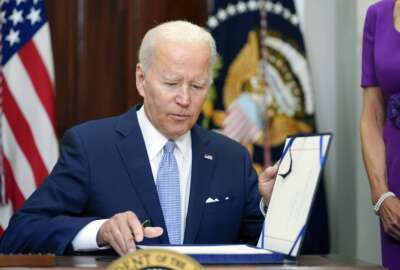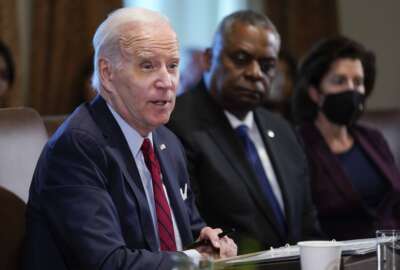5 reasons AFGE is hopeful about the Republican Congress
"Those we can't sweet talk, we're going to work like hell to vote out of office," said AFGE President J. David Cox. But it may not get to that.
The American Federation of Government Employees has descended on Washington in hopes of convincing Congress, particularly the Republican majority, to invest in federal programs and employees’ paychecks. The strategy: a mix of diplomacy and fist- pumping.
“AFGE’s not taking crap off of none of them. We are not taking it. We are going to fight back and we’re going to push back. Those we can’t sweet talk, we’re going to work like hell to vote out of office,” said AFGE President J. David Cox.
Nonetheless, Cox sees reasons to believe that the sweet talk, mixed with just the right amount of arm-twisting and good, old-fashioned union protesting, might be what AFGE needs to get its way in the new Congress.
Here are five of those reasons.
Adversity makes the union stronger
AFGE’s membership is growing quickly. It has surpassed 290,000 people and the union hopes to reach 300,000 within a year. Union members are reliable voters, Cox noted.
“When they punch at us, we punch back. We sign up another union member. We make another activist,” he said.
Right now, the many AFGE members who work at the Homeland Security Department are concerned that Congress will fail to pass a clean spending bill for the department before Feb. 27, when the current funding law expires. Should that happen, Secretary Jeh Johnson plans to furlough 30,000 employees.
“Thus far, any type of government shutdown has been AFGE’s finest hours and we’ve demonstrated that the American public has run to our rescue,” Cox said.
The challenges have drawn AFGE closer to some of its competitors, he said. He jokingly refers to National Treasury Employees Union President Colleen Kelley as his bosom buddy.
“In tough times, we understand we’ve got some tough battles and the only way we’ll win is through some solidarity,” he said.
The union is planning a rally tomorrow with other labor groups, including several that represent Postal Service employees.
Even Republicans have federal employees in their districts
A “large, large” — in fact, possibly the largest — number of GOP lawmakers, many of them freshmen, have agreed to meet with the union this week, said Cox.
AFGE represents federal civilian employees from the Border Patrol to the Defense Department. Many vote Republican, he noted.
“We’ve certainly been tapping in to our conservative, Republican members [to say,] “This is your opportunity. You need to go. You need to work with these folks,” Cox said. “Every time I get Republicans and Democrats out seeing what our members do, they ooh and ah and they’re amazed with the work that they do. They also take great pride that those facilities are in their congressional districts.”
For example, the union has brought employees of Tinker Air Force Base in Oklahoma City to Washington to meet with the Oklahoma delegation.
“What member of Congress wants to close down Tinker Air Force Base and get rid of it in the state of Oklahoma? Half of the economy of Oklahoma would disappear,” he said. “That group has always had a strong relationship with their members of Congress, all of whom are Republican.”
No one is saying there won’t be a pay raise
Cox is optimistic that federal employees next year will see a pay raise of at least 1.3 percent, which President Barack Obama proposed in his fiscal 2016 budget.
More and more Republicans are endorsing the idea of a federal pay raise this year, although they aren’t saying how big that raise would be.
“As to a specific number, I’m not quite at the point of saying that the President’s number is something we could reflect in the budget, but I’ll certainly be advocating that we should improve the pay scales for federal employees,” Rep. Rob Wittman (R-Va.) told reporters after addressing AFGE.
“We’ll be looking at the entire budget,” he said, echoing another powerful Republican, Rep. Jason Chaffetz (R-Utah), who spoke last week to NTEU members.
“One reason I think they’re not committing is because they might be contemplating something higher,” Cox said of lawmakers. While the union is hoping for a 3.8 percent raise, Cox recognized that probably was unrealistic by joking he also would like to be 21-years-old again.
Republicans say sequestration is a dumb idea
“One of the things at the top of our list is to set aside sequestration. By all means, it is harmful and doesn’t let us do the job we need to do,” Wittman told the AFGE audience.
He vowed to oppose any sort of arbitrary cuts, whether on federal spending or the workforce. Wittman said he believes Congress is willing to set aside the across- the-board cuts known as sequestration when it comes to defense.
“With all the dangers we see around the world, it has to be,” he said.
Wittman chairs the House Armed Services Committee panel on readiness, which oversees the defense civilian workforce. But he would like this year’s budget discussion to reach beyond defense to include the cuts that may befall nondefense programs as well, he said.
The GOP-led Senate might not confirm a new TSA leader
It might seem odd that the union that represents airport security officers is not clamoring for a new agency administrator. But AFGE is licking the wounds left by former Administrator John Pistole, who left late last year.
“I wish him the best of luck with whatever he does and I hope he never returns to government service,” Cox said.
The union says Pistole’s tenure was marked by tense negotiations over bargaining rights.
Now that Pistole is gone, Cox says he has met with DHS Secretary Jeh Johnson and Deputy Secretary Alejandro Mayorkas. He said he hopes they will roll back some Pistole-era policies that limited security officers’ abilities to influence or appeal personnel decisions.
RELATED STORIES:
AFGE pushes for TSA workers to have due process rights
Chaffetz supports a federal pay raise but wants something in return
Copyright © 2024 Federal News Network. All rights reserved. This website is not intended for users located within the European Economic Area.





